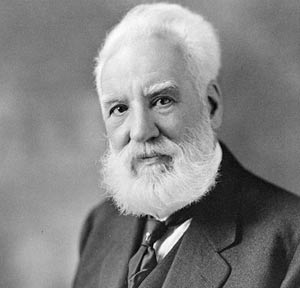Alexander Graham Bell (1847-1922) Scottish inventor, most notably credited with inventing the modern telephone.
“A man, as a general rule, owes very little to what he is born with — a man is what he makes of himself.”
– Alexander Bell
Alexander was brought up in Edinburgh Scotland. From an early age he had an inquisitive mind and became fascinated with acoustics and voice patterns. This interest in acoustics and communication was partly inspired by his mother’s growing deafness. He devoted considerable time to providing solutions for the blind and became well known in that field. He helped American Helen Keller to find treatment for her deaf-blindess
In 1870 he went to live in Canada where he developed a method of teaching speech to the deaf and in 1873 he became a professor of vocal physiology at Boston University. In 1876 he developed a patent for the telephone, something he had developed during long evening sessions with the mechanic Thomas Watson.
The first telephone call was made on August 3rd 1876, where he successfully placed a call to another house 6km away on an improvised piece of telephone wire. The first spoken words were:
Mr. Watson — Come here — I want to see you.
This proved it was possible to communicate over long distances for the first time.
in 1879, the Bell Telephone company bought Edison’s patent for carbon microphone and this enabled a big improvement to Bell’s initial telephone design. The Bell telecommunications company proved very successful. By 1886, over 150,000 people in the US, owned a telephone. It went on to become one of the most successful modern inventions. Ironically, Bell wasn’t over-keen on his invention. He later felt it detracted from his other scientific works, and he himself wouldn’t have a telephone in his office.
Later inventions of Bell included, the photophone, a device that transmitted sound on a beam of light and the gramophone, which recorded sound on a wax disc. He made many important discoveries and inventions throughout his life. He wrote of his passion for inventing:
The inventor…looks upon the world and is not contented with things as they are. He wants to improve whatever he sees, he wants to benefit the world; he is haunted by an idea. The spirit of invention possesses him, seeking materialization.
Towards the end of his life, he carried out research in the field of aerodynamics, looking at giant kites and hydrofoils.
Bell died of anaemia on 2nd August 1922, in his Scottish estate of Beinn Bhreagh, Nova Scotia.




No comments:
Post a Comment